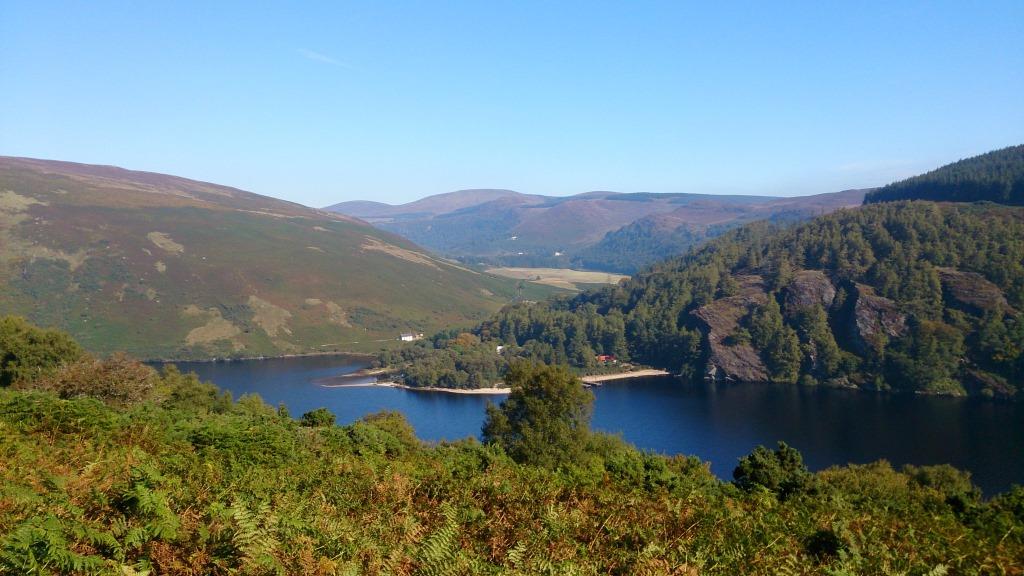Featured hike – Scarr – Wicklow Mountains

Scarr mountain, (the name derives from ‘Sgurr’ which means a rocky ridge or peak), sits on the eastern edge of the Wicklow Mountains National Park, some 5 kilometres north of the better known and much visited scenic valley of Glendalough.
In contrast Scarr offers a much quieter experience. It too has a magnificent glacial ribbon lake, Lough Dan; and offers wonderful all round views from its’ breezy summit.
Though only 641 metres above sea level, it has a reputation as a windy and exposed hill, and hikers can often find themselves having to change their plans to avoid the windswept elongated summit ridge. However, its lower height means you can often stay below the low cloud on Scarr, when other mountains are draped in impenetrable hill fog.
The mountains here are predominantly of granite, emplaced some 450 million years ago when two great continents collided. The granite is surrounded by a rock called mica-schist, altered from the original mudstones by tremendous heat and pressure when the molten granite forced its way upward through the Earth’s crust. These monumental forces were followed by millions of years of erosion by successive ice ages to eventually expose the granites.
On Scarr the summit is a cap of the overlying schists, not entirely removed by the ice, with the granite beneath.
The vegetation here is sparse, the thin peaty soil is stony and very poor in nutrients, what there are will be leached out by the rains. This leaves a landscape of heath, moss, sedge and bilberry. Deer and a few sheep graze these hillsides, and this prevents tree regeneration and keeps the vegetation short.
On the lower flanks of the mountain are commercial conifer plantations, dark and mostly empty of life, they act as a shelter for the deer in bad weather, as well as home to the occasional pine marten.
The mountain has an elongated summit ridge, maybe half a kilometre long and running roughly north to south. There are long broad ridges, or spurs to the north and to the south, with another shorter spur going east.
Our hike takes us past Lough Dan, a glacial lake in a beautiful setting, with a backdrop of woods and mountains. The lake follows the line of the hills, turning left, and we follow, gaining height as we do, heading up the long spur towards the Bracket Rocks, a series of rocky knolls that mark the northern end of the mountain.
In misty conditions these outcrops can take on a different aspect, menacing and brooding, and threading a way through them requires local knowledge and some navigational skill. It can be very boggy, and the wet peat can soon swallow a miss placed foot.
Our path now turns south and ascends more steeply as we head for Kanturk, a name that translates as the head of the wild pig, a prominent knoll on the northern flank of Scarr. As we climb past Kanturk the summit of Scarr is visible ahead, and within a few minutes we are climbing the last few steep steps to the summit.
At last we get a chance to take in the long reaching views, east to the coast and west into the Wicklow Mountains, valley following ridge following valley away into the distance.
As we take the undulating ridge south the wooded valleys and rolling hills of east Wicklow lie to our left, whilst the starker and more rugged landscape of the mountains lie straight ahead and to our right.
Our path now descends a broad heather clad spur towards Paddock Hill, but before we reach it we go left on an old track, past coniferous plantations. Soon we meet up with the Wicklow Way, a 127 km long distance path that runs the length of the Wicklow Mountains.
We follow the Wicklow Way down a farm track, gently meandering past fields and houses, until we reach a minor road, which we then follow to retrace our steps back to the vehicles.
If you have enjoyed this blog and want to know more, please follow the link to our website, hiking Scarr mountain.
Our next guided hike of this impressive landscape is on Saturday 26th March, why not join us?
Russ Mills is the owner and chief guide at Mountaintrails, and has been hiking, climbing and guiding for nearly 40 years.
